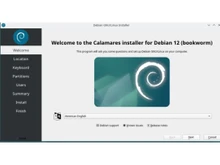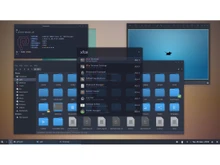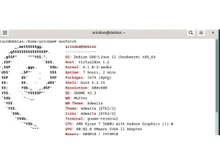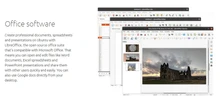Debian and Ubuntu stand strong as leading players in the field of Linux distribution, each offering robust solutions for various computing needs. Both are open-source platforms that share their commitment to reliability and stability. Debian and Ubuntu differ significantly in terms of system architecture, package management, and user interaction.
We'll differentiate both solutions based on their pros and cons, system administration, and software repositories to help you make an informed decision.
Debian vs Ubuntu: An Overview
Debian came into existence as an open-source and free operating system, and it is also one of the older Linux distributions available in the market. It is a robust Linux distribution that is known for its stability, security, and commitment to providing a versatile platform to users.
On the other hand, Ubuntu is a popular Linux distribution network well-known for its user-friendly interface and extensive security features. In addition, Ubuntu comes pre-installed with a wide range of software modules, including productivity tools, multimedia applications, and development tools.
Between Debian and Ubuntu, Debian is well-known for its stability, while Ubuntu is favored for its customization.
Debian vs Ubuntu: Pros & Cons
- Installation and usage differ greatly between both distributions. For simple installation and usability, Ubuntu is a preferred choice. In addition, both installation and handling of Ubuntu are much easier than in Debian.
- Ubuntu is more user-friendly than Debian, so it will be an excellent choice for beginners.
- Based on hardware compatibility, Ubuntu can seamlessly work with both the latest and the traditional hardware, unlike Debian, where the developers are actively working to improve its hardware compatibility.
- Due to its limited features, Debian is way more stable and robust than Ubuntu.
- Debian server versions are preferred over Ubuntu servers since Debian is a more stable and secure solution.
Debian vs Ubuntu: In Terms of Features
- Software Library: Ubuntu has a large software library where the users can easily find several capable software options, such as LibreOffice, which is a good alternative to MS Office. Ubuntu's software options consist of Audacity, VLC Player, Stream, Chrome, and Firefox. On the contrary, Debian offers limited support for software libraries.
- Server Usage: Debian server is preferred over Ubuntu server. This is because Debian is a more secure and stable option. On the other hand, Ubuntu comes with pre-packed software, which is best for specific use cases.
- Desktop Environment: Debian does not come with a default desktop environment. So, the installer will first ask you to choose a desktop interface during the installation process. The options can range from lightweight windows to full-featured desktop environments. In addition, the Debian desktop environment is more lightweight than Ubuntu. On the other hand, Ubuntu uses an out-of-the-box interface, which is installed by default. Its desktop version is more user-friendly than Debian.
- Release Cycles: Debian has three different release cycles, namely testing, stable, and unstable. On the other hand, Ubuntu has two release versions that are regular and long-term support.
Debian vs Ubuntu: Servers
When choosing between Debian and Ubuntu for server use, there are specific parameters that one needs to consider. Stability is an important factor for the server environment, and Debian’s strong focus on thoroughly tested software can be advantageous. However, there is a possibility that some of the users might opt for more frequent updates and newer software versions available in Ubuntu. Apart from stability, support option is also an important feature to consider for server environments. Debian and Ubuntu offer community support; Ubuntu comes with the added benefit of professional support services from Canonical.
Debian vs Ubuntu: Performance
Based on performance, both Debian and Ubuntu work faster. However, Debian does not offer any bundled or prepacked packages without added features. It is lightweight and super-fast compared to Ubuntu. On the other hand, Ubuntu works faster than any other operating system, like Windows or macOS.
Debian vs Ubuntu: Target User Groups
Ubuntu will be an ideal choice for beginners due to its advanced features. However, if you’re an experienced user, you should opt for Debian, which needs more manual configuration settings.
Debian vs Ubuntu: Security Features
Both these Linux distributions come with an in-built security system for detecting possible threats and vulnerabilities. Compared to Ubuntu, Debian provides a strict user policy implementation. However, Debian does not provide any access control management system to protect firewalls. In addition, AppArmor and firewall are already enabled in Ubuntu with an intuitive and straightforward user interface.
Debian vs Ubuntu: Installation Process
Based on the installation process, Debian has a complex and slightly trickier installation process compared to Ubuntu. While Debian uses the Debian installer on nCurses, Ubuntu, on the other hand, takes the help of Ubiquity, which is based on different parts of the Debian installer. With Debian installer, you will get more configuration options, but all of them are manual, making it difficult for beginners. On the other hand, Ubuntu installer is user-friendly and will not offer many configuration options, unlike Debian.
Which is Better, Debian or Ubuntu?
Debian outshines Ubuntu in various key areas, thereby making it a favorable choice for users. First and foremost, Debian offers support for nine hardware architectures that range from amd64 to arm64 and PowerPC. In addition, Debian is way more stable and robust than Ubuntu.
On the other hand, Ubuntu shines under the software library category, where users can find many capable software options, including LibreOffice, which is similar to MS Office. Ubuntu's software options include Audacity, VLC Player, Stream, Chrome, and Firefox. On the contrary, Debian offers limited support for software libraries.


 3 Ratings & 0 Reviews
3 Ratings & 0 Reviews






















